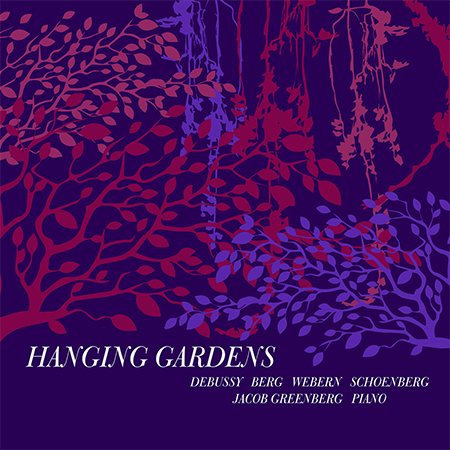by Jarrett Hoffman

The musical relationships both here and throughout the album are revealed expertly and intimately by Greenberg. In the debate over the role of performer vs. composer, the pianist strikes a beautiful middle ground, playing the works at hand with respect, love, and appreciation, while also pulling out his highlighters now and then to point up certain remarkable moments.
Big chunks of music make up the majority of the album: Debussy’s Two Books of Préludes, a book on each disc, and Schoenberg’s song cycle The Book of the Hanging Gardens. These large works can be a lot to handle taken all together; give yourself some personal “intermissions” to fully enjoy them.
Joining Greenberg for the Schoenberg is a fellow ICE member: soprano Tony Arnold, who, like the pianist, studied at Oberlin College and Northwestern University. Whether it’s their backgrounds or their time together as colleagues, the pianist and vocalist make for an exceptional pairing — Greenberg bringing the utmost sensitivity to his playing, Arnold bringing warmth and smoothness to her low register and a touch of the eerie to high sections of this disquieting piece.
Another inspired pairing: Schoenberg and poet Stefan George. Music and text combine well in this arc of a romance ending with one lover’s exit but with little closure. The eleventh movement is the clear highlight, so ghostly and chilling as the poem’s speaker looks back on one moment “behind the flowered gate…did we obtain the blisses we had imagined?”
People can be picky with how they like to listen to Debussy’s Préludes: in preferred groupings, in a certain order, or all the way through as written. Put Greenberg’s collection into your computer, arrange the movements however you like, and enjoy the pianist’s infinite flexibility of articulation and mood in them all.
A few movements deserve special note. Greenberg summons a glistening magic in “The Hills of Anacapri,” an overwhelming sense of foreboding in “What the West Wind Has Seen,” and radical contrast in “Interrupted Serenade.” And you won’t soon forget his delicate touch in “The Terrace of Moonlit Audiences,” or the explosiveness of the “Fireworks” that bring the album to a close.
It would be easy to leave out a discussion of Webern’s Op. 27 Variations, which close the first disc. They’re a quarter the length of the Schoenberg, and a twelfth that of the combined Préludes, but Webern makes spectacular use of time. If anything, set aside 44 seconds in your day to listen to the second movement. It’s more exciting than some roller coasters — plus there’s no height requirement.
Published on ClevelandClassical.com September 4, 2018.
Click here for a printable copy of this article



